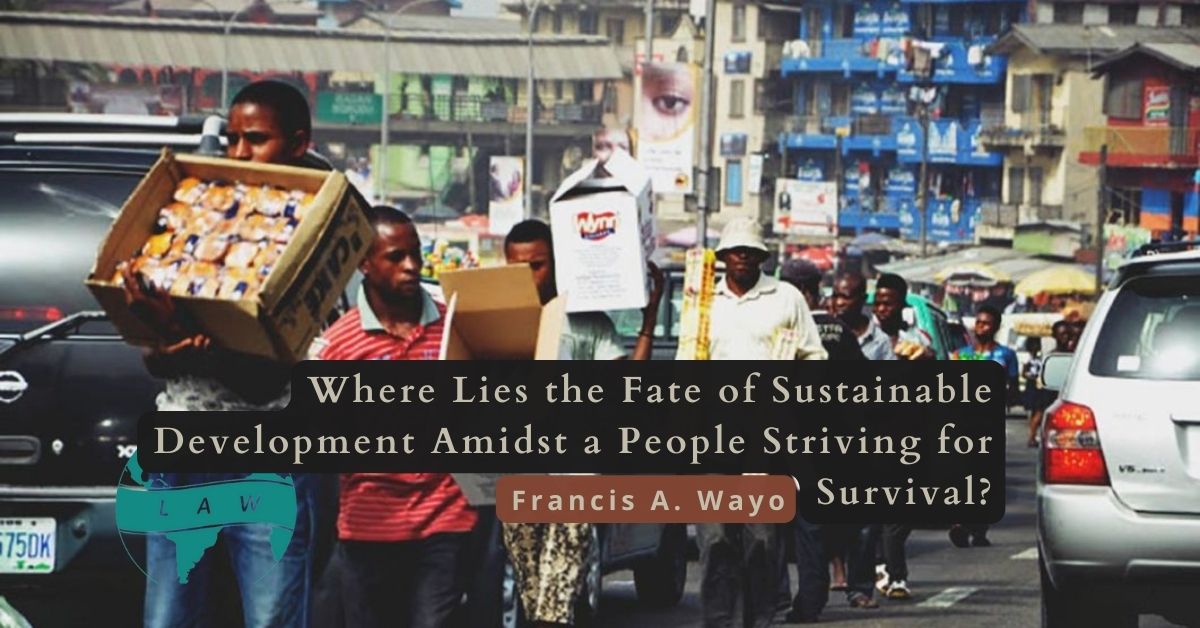Where Lies the Fate of Sustainable Development Amidst a People Striving for Survival?
Imagine a person living on a minimum wage of N30,000 per month in the present day Nigeria where the price of cooking gas is around N1, 400 per kilogramme. Between a gas stove and “Abacha stove”, which do you think s/he will use in cooking? It is glaring that s/he will opt for the latter even though the former is more sustainable.
Sadly, the preceding scenario emblematises the reality in many African nations where most people are driven by survival. Taking this situation into concern, this essay succinctly explores the fate of sustainable development in such nations like Nigeria amidst the poverty-stricken population.
Understanding the Concept of Sustainable Development
As the world navigates towards a green earth, “sustainability” underpins modern development hence the concept of sustainable development which means a “development that meets the needs of the present, without compromising the ability of future generations to meet their own needs.”[i]
While the concept is multidisciplinary as it encompasses environmental, technological, economic and governance issues,[ii] at its heart is the idea of eco-friendliness due to the dependence of human life on the environment hence human development must not lead to overexploitation, pollution, and degradation of the land, water, and air space.
Consequently, striving towards sustainable development entails developing without degrading the environment, which must be protected and preserved as Ken Saro-Wiwa forewarned that “the environment is man’s first right, we should not allow it to suffer blight…”[iii]
To Survive or Sustain: The Dilemma of Pursuing Sustainable Development in a Developing Nation like Nigeria
Notwithstanding the realisation of the imperativeness of engaging in acts that will not harm the environment nor exacerbate environmental problems, it is worth noting that the concept of sustainable development is still treated like an outcast in many underdeveloped and developing nations in which people are grappling with lack of basic needs of life (water, food, shelter, and clothing).
With statistics showing that over 60% of people living in Nigeria are multidimensionally poor,[iv] it becomes almost a Sisyphean task to tackle unsustainable practices like open air defecation, deforestation, use of charcoal, plastic pollution, and use of fossil fuel amongst others.
This is simply because the bulk of the population cannot afford to live a sustainable life hence, they must cut their coat according to their cloth. Consequently, the fate of sustainable development in Nigeria and Africa at large, which is currently the world capital of poverty,[v] appears to be like the biblical account of the “seed that fell among thorns, and the thorns sprang up and choked them”.[vi]
Beyond the Gloom: Finding the Prospect for a Sustainable Future
Even though what may seem to be the fate of sustainable development in Nigeria appears gloomy, it is in no way a fait accompli that sustainable development cannot be achieved.
Although Africa produces less greenhouse gas emissions, its vulnerability to climate change is high, and a prognostic estimation posits that adapting to climate change in the continent would cost a yearly spending of $50 billion by 2050.[vii]
In fact, the heat is already felt through issues such as insecurity, incessant floodings, food shortage, and lack of sustainable drinking water and sanitation which are directly/indirectly ensuing effects of climate change.
Consequent to the foregoing, it behooves humanity (poor and rich) to embrace sustainable development. Since doing so in a poverty-ridden place like Nigeria is not very prospective, there is need to beaver up efforts and take a holistic approach in addressing issues like poverty, access to education, and the other Sustainable Goals Development Goals (SDGs) which are all intrinsic to achieving sustainable development.
More specific to the environment, addressing the issue of poverty is key because doing so requires addressing issues such as housing and urbanisation, water and sanitation, and waste management amongst others. Also, creating environmental awareness and financing sustainable environmental management will be instrumental in driving sustainable development.
Conclusion
If we really understand our place in society and that of nature, the dependence of humanity on the environment will erase any modicum of doubt surrounding the need to strive towards achieving sustainable development. Thus, expunging obstacles like poverty is a must as we all have a role to play in safeguarding the earth, our only abode.
[i] Brundtland Commission, available at < here > accessed 23 January 2023
[ii] Paulinus Chukwudi Nweke, “Poverty and the Quest for Sustainable Development in Africa: Reality, Challenges, and Opportunities” (2018)
[iii] Laura Westra, “Development and Environmental Racism: The Case of Ken Saro-Wiwa and the Ogoni” (19
[iv] Ruth Olunrobi, “Nearly Two-Thirds of Nigerians Live on Less Than $2 a Day” (18 November 2022, Bloomberg) < here > accessed 23 January 2024
[v] Paulinus Chukwudi Nweke, “Poverty and the Quest for Sustainable Development in Africa: Reality, Challenges, and Opportunities” (2018)
[vi] Mathew 13: 7
[vii] Africa Development Bank, “Climate Change in Africa” < here > accessed 23 January 2024
Image Credit: The Guardian Nigeria
About Author
Francis Aondongu Wayo is a final-year Law student at Obafemi Awolowo University, Ile-Ife where he currently heads the Law Students Society’s “Advocate International Law Journal”. His research interest spans Intellectual Property, Alternative Dispute Resolution, Human Rights, and Environmental Law. Contact: + 234 810 6877 966; wayofrancisaondongu@gmail.com or fawayo@student.oauife.edu.com



Leave a Reply